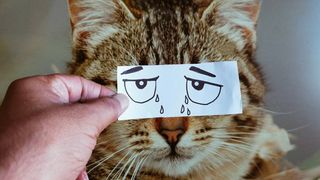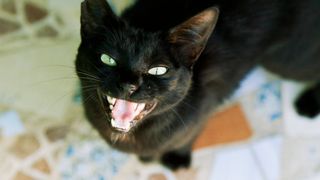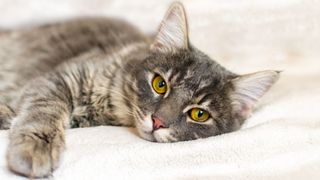Why is my cat crying? Vet's guide to what it means and what to do
Cat crying getting you down? Our vet reveals the most common causes and what to do about it

If you’ve noticed your cat crying and are concerned something might be wrong, rest assured, you’re not alone. There are two forms of crying in cats - tears and excessive vocalization in the form of meowing and howling, and it’s worth being aware of the causes of both so you can decide on the best course of action.
Many pet parents see their cat with tears in their eyes and assume that their little feline friend is upset, but although a cat's tear ducts function in the same ways as humans, they don’t cry emotional tears. So, if your kitty isn’t crying because you took away their toys or refused to give them an extra helping of the best dry cat food, why are they suddenly looking all misty eyed?
Well, the most likely answer is that they’re experiencing discomfort from an underlying condition. Environmental allergies, such as dust and pollen, as well as food and chemical allergies are all potential triggers that can cause your kitty to tear up. If you’ve ever found yourself asking the question ‘can cats get a cold?,’ the answer is yes, although it’s referred to as cat flu, and this is another common reason for crying.
Alongside crying tears, there’s also verbal crying to consider. While cats will meow for attention, continuous loud meowing or howling is usually a sign of pain or discomfort and can be caused by things such as your fur friend having been in a fight or experiencing things like anxiety or feline cognitive dysfunction.
Below, Dr. Joanna Woodnutt sheds more light on why your cat might be crying tears or vocalizing excessively and shares her tips on what you can do about it. Check out our guide to cat communication or read on to discover everything you need to know about crying in cats.

Dr Joanna Woodnutt qualified as a veterinarian from the University of Nottingham where she then went on to practice companion animal medicine in the Midlands. She really took to the consulting side of things and helping clients with medical problems such as dermatology, behaviour and nutrition - anything that involved helping clients understand their pets better.
What does cat crying sound/look like?
Cats don't cry from sadness like humans do. While cats show emotion in a number of ways, it’s not known how much they feel sadness, and they don’t show it either by producing tears or by howling like a human might.
However, you might think your cat is crying if they’re making loud meows at night. This yowling/howling sound can easily be mistaken for a baby’s cry. In fact, I remember as a child waking up to a cat crying at night and thinking next door’s toddler twins had somehow got out of the house and were in the garden!
When a cat cries tears, you might worry that they’re sad. Dampness around the eyes, a loss of hair around the eyes, red eyes, and a build-up of tears in the eye are all signs that your cat has been producing tears. They’re not ‘crying’ in the human sense of the word, but this is an important symptom that shouldn’t go ignored.
Why might my cat be crying?
Cat crying can happen for a number of reasons, and these will be different depending whether they’re meowing loudly or producing tears.
Let’s look at some of the common reasons for cat crying:
Why might my cat be crying tears?
All cats produce tears to lubricate their eyes. Tears are continuously produced by the tear gland and are drained away through a hole in the bottom of the eye that leads to the nose (the tear duct).
If your cat is crying tears, that suggests they’re either over-producing tears due to irritation, or the hole that drains the tears is blocked. Some reasons for cats to cry tears include:
- Cat flu
- Allergies
- Injury to the eye
- Foreign object in the eye
- Eye irritation
- Blocked tear ducts
Why is my cat meowing so loud?
On the other hand, if your cat is crying verbally with loud meows, there are different possible causes. Your cat might be meowing loudly due to pain, or during a cat fight.
Female cats may also meow loudly while they’re in season – this type of meowing will be accompanied by a strange swaying motion. There are also some diseases that cause cats to start meowing more than usual.
Some reasons for cats to meow loudly (cry) include:
- Oestrus (being ‘in season’)
- Fighting
- Communicating with other cats
- Pain
- Anxiety
- Feline cognitive dysfunction (dementia)
- Partial or complete blindness
- Hyperthyroidism
- High blood pressure

What does it mean when cats cry at night?
Cats are more active at dawn and dusk, which means you might be more likely to hear your cat crying at night.
In general, a cat crying at night isn’t specific to any one reason and it could be caused by any of the reasons listed above.
However, cats that are becoming night blind may be fine during the day and only cry at night. Cats that are crying due to fighting with other cats may also only cry at night, when other cats are more likely to be around.
What to do if your cat is crying
If your cat is crying, you should consider whether they need to see a vet. Any cat that is crying tears should see a vet within the next 12 hours – many eye conditions that cause tear production can result in blindness if left untreated.
On the other hand, if your cat is yowling, you should consider any other possible symptoms. Are they agitated? How is their appetite? Has this come on suddenly? If they’re female, are they spayed?
There’s lots of possible reasons for cats to start crying and if you aren’t sure, it’s best to talk to your vet to rule out some of these problems. If your cat is older than 10, many of these diseases are a lot more likely, so even if meowing is the only symptom you should definitely book a vet visit within a few days, and sooner if you’re worried.
How to tackle excessive meowing and yowling in cats
How you can stop excessive meowing in cats will depend on the cause. For instance, crying due to being in season won’t stop until a cat is neutered or mated. Although the cat will naturally stop her season eventually, she’ll come back into season very quickly if she isn’t neutered, meaning she’ll carry on crying until she’s spayed.
Excessive vocalisation due to a disease won’t improve either – it’ll only get worse. Unless you’re sure your cat’s crying was due to communicating or fighting with other cats, you should book a vet visit to find the cause. They’ll be able to suggest medication or behavioral modification to prevent yowling.

How to stop a cat crying at night
If your cat is crying at night, you’ll need to rule out some common conditions before trying to stop them. You should take them to see a vet, who will help you to make sure nothing is physically wrong. Once that’s done, you can start trying to change their behavior.
The first step is trying to tire them out more during the day using playtime. You should also instigate play in the evening, when your cat is naturally more active.
Food puzzle toys are also good ways to help mentally tire out your cat to stop them staying up crying all night.
Cat crying is a non-specific sign with lots of possible causes, but sadness is not one of them. Taking care of your cat by taking them to the vet if they’re crying is part of responsible pet ownership. If you're after more helpful advice, check out our solutions to the most common cat behavior problems.
PetsRadar Newsletter
Get the best advice, tips and top tech for your beloved Pets
After graduating as a veterinarian from the University of Nottingham, Dr Joanna Woodnutt went on to practice companion animal medicine in the Midlands. She quickly developed a love of consulting and helping clients with medical problems such as dermatology, behaviour and nutrition - anything that involved helping clients understand their pets better. Jo started writing about pet health in 2017, realising that it meant she could help even more pet parents. Since then, she has written for countless online and print publications and is a regular contributor for Edition Dog Magazine. Jo now lives in the Channel Islands with her husband Ian and terrier Pixie, and they are expecting their first child very soon.
